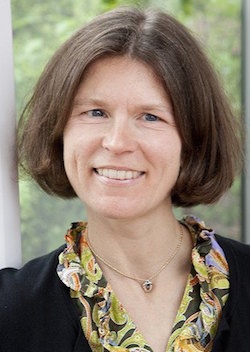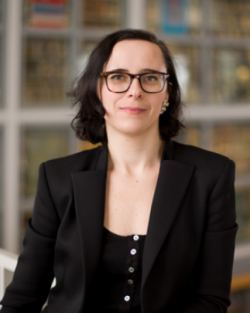
German-Engineering FSP: Green City, Sustainable Engineering in Berlin
Berlin, GermanyTHIS PROGRAM IS OFFERED ONCE EVERY TWO YEARS
ABOUT THIS PROGRAM
The Department of German Studies and the Thayer School of Engineering offer a joint foreign study program in Green City, Germany's self-proclaimed "capital of sustainability" in Berlin. The program was successfully launched in the spring term of 2022 and is scheduled to run again in the spring terms of 2024, 2026, and 2028. This program invites students to combine engineering coursework that focuses on "green" and sustainable engineering with a fast-track German course (GERM 2.03) that combines GERM 2 and GERM 3 into one intensive course and satisfies Dartmouth's foreign language requirement. It is also open to students who already have German language skills beyond the beginner's level. It takes students to a full-immersion setting and cultural environment in which sustainability is a lived practice. The program structure is flexible, giving students options to customize their course choices in accordance with their D-plans.
Enrollment Information
About 18 students are selected for the program.
For more information about applying for this program, see our webpage on How to Apply & our FAQs under section 2 (How to Apply: Application)
THE STUDY ABROAD EXPERIENCE
ACADEMIC PROGRAM
Faculty Director
 Petra Bonfert-Taylor Professor of Engineering
Petra Bonfert-Taylor Professor of Engineering Curriculum
Students choose any three from the following four courses. Each course carries one course credit.
ENGS | 37 | 90: Introduction to Environmental Engineering*
ENGS | 45 | 90: Sustainable Urban Systems (Berlin)
GERM | 2.03 | 90: Fast-Track German in Berlin--This class will consist of both GERM | 2 | 90: Introductory German and GERM | 3 | 90: Intermediate German. Please note this is one course.
GERM | 44.07 | 90: Metropolis Berlin. Taught in English with optional German major/minor credit.
*ENGS 37 and ENGS 45 will be taught sequentially during the program
Prerequisites
GERM | 1 (Introductory German) or equivalent German language skills
MATH | 3 (Calculus)
Additional prerequisites vary depending on the choice of courses:
For ENGS | 37: CHEM | 5 (General Chemistry); *
For ENGS | 45: ENGS | 37 (Introduction to Environmental Engineering) or equivalent;*
For GERM | 44.07 with German major/minor credit: one intermediate-level German classes (GERM | 5, GERM | 6, or GERM | 10).
Without the German major/minor credit option, GERM | 44.07 has no prerequisites.
For GERM | 2-3 | 90: a final grade of A- or better in GERM | 1 is strongly recommended
*ENGS 37 and ENGS 45 will be taught sequentially during the program
Faculty Director
 Yuliya Komska Associate Professor of German
Yuliya Komska Associate Professor of German Curriculum
Students choose any three from the following four courses. Each course carries one course credit.
ENGS | 37 | 90: Introduction to Environmental Engineering*
ENGS | 45 | 90: Sustainable Urban Systems (Berlin)
GERM | 2.03 | 90: Fast-Track German in Berlin--This class will consist of both GERM | 2 | 90: Introductory German and GERM | 3 | 90: Intermediate German. Please note this is one course.
GERM | 44.07 | 90: Metropolis Berlin. Taught in English with optional German major/minor credit.
*ENGS 37 and ENGS 45 will be taught sequentially during the program
Prerequisites
GERM | 1 (Introductory German) or equivalent German language skills
MATH | 3 (Calculus)
Additional prerequisites vary depending on the choice of courses:
For ENGS | 37: CHEM | 5 (General Chemistry); *
For ENGS | 45: ENGS | 37 (Introduction to Environmental Engineering) or equivalent;*
For GERM | 44.07 with German major/minor credit: one intermediate-level German classes (GERM | 5, GERM | 6, or GERM | 10).
Without the German major/minor credit option, GERM | 44.07 has no prerequisites.
For GERM | 2-3 | 90: a final grade of A- or better in GERM | 1 is strongly recommended
*ENGS 37 and ENGS 45 will be taught sequentially during the program
STUDENT LIFE
Students live in a homestay for the full duration of the program. The homestay living arrangement is an integral and required component of this program. The homestay experience often offers several benefits, including improved language skills (especially in foreign language environments), deep cultural insights, integration into the local community, the opportunity to experience daily life like a local, and the chance to build meaningful relationships.
The cultural program will include numerous excursions, such as trips to Sanssouci Palace and the Filmpark Babelsberg in Potsdam, the memorial site Sachsenhausen, the Mauerpark and Checkpoint Charlie, and a historical tour of the Berlin subway. It will also include visits to the opera, concerts, museums, and cinemas from Berlin's vibrant cultural offerings. In addition, the program will feature day trips (e.g. to the Volkswagen manufacturing plant in Wolfsburg) and one extended overnight trip to Zurich, Switzerland. Overnight stops in the Rhine Valley, the Ruhrgebiet, and Munich will provide opportunities to study how culturally and historically diverse regions are dealing with the challenges of sustainable living, mobility, and industrial production.
For more information, please see the Department of German Studies' website and/or the Thayer School of Engineering's website.
FINANCING YOUR PROGRAM
TUITION AND FEES
The fees charged by the College for a Dartmouth-sponsored off-campus term of study include regular tuition charges for a term at Dartmouth, service fees, as well as the specific costs established for each off-campus study locale. In many programs, the room and board costs tend to be higher than for a term in Hanover. You can view a budget sheet for each program by clicking on the appropriate term under "Financing Your Program". The cost of transportation to and from the site is the responsibility of the student.
Financial Aid
In order that all qualified Dartmouth undergraduate students may have the opportunity to take part in off-campus programs, the College endeavors to adjust its normal financial aid awards for students already receiving aid. Tuition and expected family contribution for Dartmouth's off-campus programs are the same as for an on-campus term.
All costs, including airfare and spending money, are considered when determining the cost of an off-campus program. Any costs more than a typical term in Hanover are met with additional Dartmouth Scholarship Funds. If you have a work expectation for the term, this will be replaced by scholarship funding for programs that span the entire term.
Students are responsible for purchasing their own plane tickets and, in many cases, meals. Often, families find that they owe less for billable items for study away terms but will instead use more of their expected family contribution towards indirect costs such as the flight and meals. For help sorting out who pays what and how, contacting the Financial Aid office is often advisable.
Financing your program | Financial Aid | Scholarships | Budgeting & Costs
Program Resources
Department Contact
 Ann Fenton Center Administrator
Ann Fenton Center Administrator 